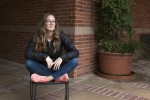Jodi Sagorin Spangler took her organic chemistry midterm the morning after returning from doing medical relief work in Nepal, where she studied in her tent at night with flash cards and a headlight.
“I would have never thought that I’d find myself working in disaster relief, but I’m glad I decided to take these opportunities because it’s changed my trajectory and my outlook,” Sagorin Spangler said.
Sagorin Spangler, a fourth-year human biology and society transfer student, said she was first inspired to pursue a career in medicine after watching a doctor set up mobile health clinics in villages in India. Sagorin Spangler said going into medicine has given her a sense of fulfillment that she did not experience in her previous work in finance or as an adventure blogger.
“I created a world that was all about me, but I really found meaning in my life through medicine,” Sagorin Spangler said.
Sagorin Spangler said she was given the opportunity to do medical relief work in 2010 through her personal doctor, Andrew Siskind. Siskind, a clinical professor and voluntary staff member at UC Irvine School of Medicine, said he told Sagorin Spangler he was flying to Haiti to provide emergency medical care to those injured in the earthquake, and she volunteered to go with him.
After the immediate relief effort following the earthquake, Sagorin Spangler went back to Haiti four times to volunteer at a medical clinic. She said many of the health issues the patients were facing were chronic rather than urgent health problems.
Though she enjoyed helping with relief efforts, Sagorin Spangler said she thinks it is more beneficial to the overall health of the community to train people living there to do medical work rather than fly volunteers who work in a clinic for a few weeks at a time.
When she returned home, she and some friends started a project called Higher Ed Haiti to raise money to send Haitian students to medical school. Sagorin Spangler said she has gone back to Haiti almost every summer and plans to go back this summer to volunteer in the clinic and check on the students they support.
In April, a 7.8-magnitude earthquake hit Nepal’s capital, Kathmandu, and surrounding areas. It was followed by a 7.3-magnitude aftershock in early May. The earthquake killed about 8,000 people and injured another 17,866 people, according to Nepal’s National Emergency Operation Center.
Sagorin Spangler said members of the medical team she had previously volunteered with asked her to help with relief work in Nepal. She knew immediately she wanted to go and made arrangements to miss the two weeks of class leading up to her midterms.
Sagorin Spangler said her role on the team was to provide triage care. She assessed injuries to see which were the most critical. Siskind said he treated patients whose injuries could be handled on-site.
Paul Khunkhun, a cardiac sonographer on the team, said the team had some challenges reaching the villages. He said it took more than five hours to cover 17 kilometers because the roads were blocked with rubble. At one point the team had to travel toward the village on foot, Khunkhun added.
Sagorin Spangler said the damage in Kathmandu was not as severe as she expected because there had been time to clear some of the rubble, but it was more serious in rural regions. People slept outside in makeshift tents, she said.
“Even families who had semblances of house structures slept outside because there were still aftershocks,” Sagorin Spangler said. “It’s terrifying to think you could be crushed in your own home.”
Sagorin Spangler said she plans to take two years off before going to medical school to develop her nonprofit organization that sponsors Haitian students interested in medicine. She said she and her friends want to formalize the program and expand it to support more students.
“I want to help with disaster relief and there still is need for foreign medical teams right after disasters,” Sagorin Spangler said. “But when you train someone to be a nurse, pharmacist or medical technician, there is a ripple effect: Someone gets a job they want and a community has access to high quality health care.”

I think choosing medicine may seem a tough decision. Doctor’s path is really difficult. Academic career isn’t that easy too. There are lots of difficulties students will definitely face with. Writing assignments are one of them. Some students try to acquire these skills; some of them apply to online writing services. I think these skills have to be developed by students because they are really useful in real life. If you think you won’t need these skills, check online essay writing service to get a professional writing help. Good luck!